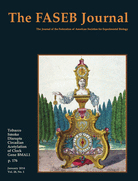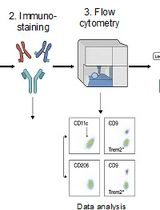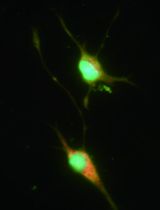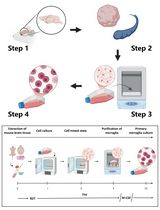- EN - English
- CN - 中文
Generation and Maturation of Human Monocyte-derived DCs
由人单核细胞诱导树突细胞的产生和成熟
发布: 2014年08月05日第4卷第15期 DOI: 10.21769/BioProtoc.1194 浏览次数: 24954
评审: Ivan ZanoniLee-Hwa TaiAnonymous reviewer(s)
Abstract
Dendritic cells (DC) are antigen-presenting cells, which play a critical role in the regulation of the adaptive immune response. They act as a bridge between the innate and the adaptive immune systems. An approach to study their function and potentiality is to generate DC-like cells by culturing CD14+ monocyte-enriched peripheral blood mononuclear cells (PBMC). In the presence of GM-CSF and IL-4, these cultures give rise to large numbers of DC-like cells. Generating human-DC from PBMC is a useful tool to study biological functions of human DC.
Keywords: Monocyte-derived dendritic cells (单核细胞来源的树突状细胞)Materials and Reagents
- Blood sample to obtain CD14+ cells
- Histopaque -1077 (Sigma-Aldrich, catalog number: 10771 )
- DPBS (Sigma-Aldrich, catalog number: D8537 )
- autoMACS Rinsing Buffer (Miltenyi Biotec, catalog number: 130-091-222 )
- Albumin from bovine serum (Sigma-Aldrich, catalog number: A1933 )
- FITC-anti-CD14 antibody (BioLegend, catalog number: 301804 )
- Recombinant human GM-CSF (Pepro Tech, catalog number: 300-03 )
- Recombinant human IL-4 (Pepro Tech, catalog number: 200-04 )
- RPMI-1640 medium (Life Technologies, InvitrogenTM, catalog number: 21875034 )
- 2-mercaptoethanol (Life Technologies, Gibco®, catalog number: 21985-023 )
- Antibiotics: penicillin-streptomycin (Life Technologies, Gibco®, catalog number: 15070 )
- Heat inactivated (at 56 °C for 30 min) qualified fetal bovine serum (Life Technologies, InvitrogenTM, catalog number: 26140-087 )
- PE-anti-CD1a antibody (BioLegend, catalog number: 300106 )
- Recombinant human IL1β (Thermo Fisher Scientific, catalog number: RIL1BI )
- Recombinant human TNFα (Thermo Fisher Scientific, catalog number: RTNFAI )
- Rabbit Immunoglobulin G (IgG) (Sigma-Aldrich, catalog number: I5006 )
- FITC-anti-CD83 antibody (BioLegend, catalog number: 305306 )
- PE-anti-CD80 antibody (BioLegend, catalog number: 305208 )
- APC-anti-CD40 antibody (BD, catalog number: 555591 )
- Isotype-matched mAbs (BioLegend, catalog number: 400113 )
- Erylyse buffer (see Recipes)
- Complete medium (see Recipes)
- AutoMACS running buffer (see Recipes)
- FACS wash buffer (see Recipes)
- Propidium iodide (Sigma-Aldrich, catalog number: P4170) (see Recipes)
Equipment
- Sterilized sierological pipettes (2, 5, 10, 25 ml) (Corning, Costar®, catalog numbers: 4486 , 4487 , 4487 , 4488 , 4489 )
- 50 ml conical tubes (BD, Falcon®, catalog number: 352070 )
- Human CD14+ magnetic microbeads (Miltenyi Biotec, catalog number: 130-050-201 )
- Filtration unit with pore size of 0.22 µm and polyethersulfone (PES) membrane (Thermo Fisher Scientific, catalog number: 431096 )
- 6-well tissue culture plate (BD, Falcon®, catalog number: 353046 )
- FACS tube (Beckman Coulter, catalog number: 2523749 )
- Refrigerated centrifuge with swing out rotor
- AutoMACS separator (Miltenyi Biotec)
- CyAn ADP flow cytometer (Beckman Coulter)
Procedure
文章信息
版权信息
© 2014 The Authors; exclusive licensee Bio-protocol LLC.
如何引用
Spadaro, M., Montone, M. and Cavallo, F. (2014). Generation and Maturation of Human Monocyte-derived DCs. Bio-protocol 4(15): e1194. DOI: 10.21769/BioProtoc.1194.
分类
免疫学 > 免疫细胞功能 > 树突细胞
免疫学 > 免疫细胞分离 > 维持和分化
细胞生物学 > 细胞分离和培养 > 细胞分离
您对这篇实验方法有问题吗?
在此处发布您的问题,我们将邀请本文作者来回答。同时,我们会将您的问题发布到Bio-protocol Exchange,以便寻求社区成员的帮助。
Share
Bluesky
X
Copy link













